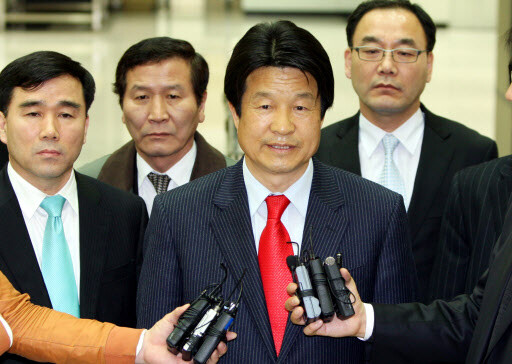hankyoreh
Links to other country sites 다른 나라 사이트 링크
[Analysis] South and North Korea paly a reverse chicken game on Gaeseong Complex

North Korea restored the hotline between military authorities in North and South Korea on Saturday, after having shut it down in protest of the “Key Resolve” joint military exercises between South Korea and the United States March 9-20. It then used the hotline to say it was allowing the free travel of South Korean personnel to and from Gaeseong Industrial Complex, returning travel between Gaeseong and the South to normalcy after various disruptions during the exercises.
South Korean Unification Ministry spokesman Lee Jong-ju says people “need to wait and see if smooth passage is guaranteed in the future.”
There are many lessons to be learned from the episode involving the Gaeseong Industrial Complex. For starters it showed that neither the North nor the South is in a position to take solitary action to bring about its closure. With 38,600 North Korean workers and with 101 South Korean companies cultivating the complex, according to the most recent count in February, the whole enterprise has taken on deep roots.
“Ironically the whole situation showed us that the Gaeseong Industrial Park could never close easily,” said the president of a South Korean company who demanded anonymity.
This is not to say there is any guarantee Gaeseong has a bright future. The problem is that both sides fail to clearly demonstrate they intend to abide by the principle of “the separation of politics and business.”
The North now faces criticism for disrupting Gaeseong’s stability and hurting its international credit rating for the sake of trying to pressure the Southern administration of President Lee Myung-bak. However, the South is not free from responsibility from using Gaeseong as a political card. Lee’s administration previously on December 1, 2008 had ordered the reduction in the number of Southern employees in Gaeseong by half, and now most recently has ordered a halt to land travel across the border.
“It must not be forgotten that it negatively influenced relations when the Lee Myung-bak administration came to power and from the very start took a passive and negative attitude towards the industrial park and inter-Korean agreements,” said Kim Yeon-cheol, Director of the Hankyoreh Peace Institute.
In March 2008, then Unification Minister Kim Ha-joong all but completely linked expansion of the complex to the North Korean nuclear issue. “It will be hard to expand the Gaeseong Industrial Complex unless the nuclear issue is resolved,” he said. This led to the first clash between the two sides following Lee’s inauguration, since in response the North demanded the withdrawal of South Korean government officials from the Gaeseong office of the Inter-Korean Economic Cooperation Office.
Following that clash in September 2008, after North and South Korea had already agreed to the building of dormitories in Gaeseong as one of several ways to reduce the Northern labor shortage there, President Lee pushed this development to the backburner saying “having dormitories with tens of thousands” of North Korean workers “could lead to labor-management strife for workers acting collectively.”
A researcher at one government-funded research instituted called the situation a “game of chicken in reverse” between Pyongyang and the Lee administration. Neither side wants to face blame and take responsibility for being the first to close the place down, so they are daring each other to do it. This researcher said the mutual discord following the North’s launch of a satellite “will be the first test” of what happens next with Gaeseong.
A “game of chicken” is where two cars charge directly at each other in what can be a head on collision if one side or the other does not “chicken out” and move to avoid a crash.
Please direct questions or comments to [englishhani@hani.co.kr]
Editorial・opinion
![[Column] Season 2 of special prosecutor probe may be coming to Korea soon [Column] Season 2 of special prosecutor probe may be coming to Korea soon](https://flexible.img.hani.co.kr/flexible/normal/500/300/imgdb/original/2024/0426/3317141030699447.jpg) [Column] Season 2 of special prosecutor probe may be coming to Korea soon
[Column] Season 2 of special prosecutor probe may be coming to Korea soon![[Column] Park Geun-hye déjà vu in Yoon Suk-yeol [Column] Park Geun-hye déjà vu in Yoon Suk-yeol](https://flexible.img.hani.co.kr/flexible/normal/500/300/imgdb/original/2024/0424/651713945113788.jpg) [Column] Park Geun-hye déjà vu in Yoon Suk-yeol
[Column] Park Geun-hye déjà vu in Yoon Suk-yeol- [Editorial] New weight of N. Korea’s nuclear threats makes dialogue all the more urgent
- [Guest essay] The real reason Korea’s new right wants to dub Rhee a founding father
- [Column] ‘Choson’: Is it time we start referring to N. Korea in its own terms?
- [Editorial] Japan’s rewriting of history with Korea has gone too far
- [Column] The president’s questionable capacity for dialogue
- [Column] Are chaebol firms just pizza pies for families to divvy up as they please?
- [Column] Has Korea, too, crossed the Rubicon on China?
- [Correspondent’s column] In Japan’s alliance with US, echoes of its past alliances with UK
Most viewed articles
- 1‘We must say no’: Seoul defense chief on Korean, USFK involvement in hypothetical Taiwan crisis
- 2After election rout, Yoon’s left with 3 choices for dealing with the opposition
- 3Why Kim Jong-un is scrapping the term ‘Day of the Sun’ and toning down fanfare for predecessors
- 4Noting shared ‘values,’ Korea hints at passport-free travel with Japan
- 5AI is catching up with humans at a ‘shocking’ rate
- 6Two factors that’ll decide if Korea’s economy keeps on its upward trend
- 7Amnesty notes ‘erosion’ of freedom of expression in Korea in annual human rights report
- 8[Editorial] Korea’s surprise Q1 growth requires objective assessment, not blind fanfare
- 9A week of protests lays bare many inherent vices of Korean health care system
- 10Yoon says collective action by doctors ‘shakes foundations of liberty and rule of law’